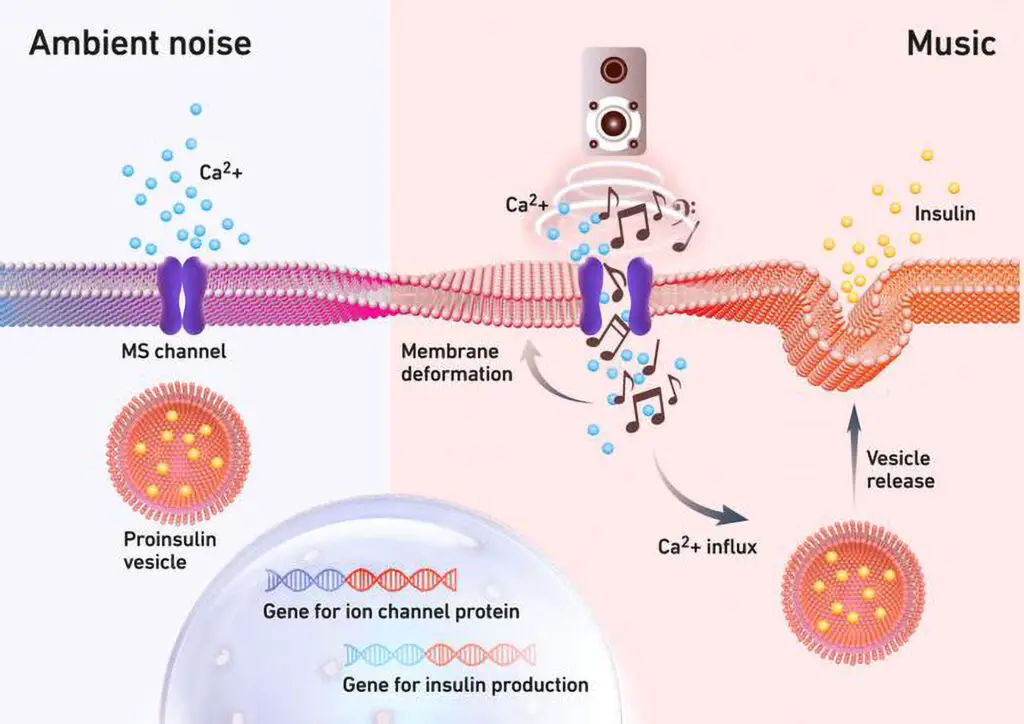Scientists in Switzerland have discovered a new way of treating diabetics by using one of Queen’s biggest hits to deliver insulin.

Experts at the Institute of Technology (ETH) Zurich’s ETH Zurich’s Department of Biosystems Science and Engineering located in the city of Basel are experimenting to see if a gene switch in special designer cells can be triggered by music to release the hormone.
And they say Queen’s anthem ‘We Will Rock You’ and tracks from the soundtrack to Marvel superhero movie The Avengers work best.
The team – led by Prof Dr Martin Fussenegger – say designer insulin-releasing cells are first released into the body.
And how much insulin they release can be controlled by positively charged ions embedded in the cell walls.
Different types of sound can trigger the release of the ions which in turn releases the insulin, they say.
A spokesperson for ETH Zurich explained: “As the scientists have been able to show, the channel in these cells opens in response to sound, allowing positively charged calcium ions to flow into the cell.
“This leads to a charge reversal in the cell membrane, which in turn causes the tiny insulin-filled vesicles inside the cell to fuse with the cell membrane and release the insulin to the outside.”

Scientists found that volume levels around 60 decibels and bass frequencies of 50 hertz were the most effective in triggering the ion channels.
And to trigger maximum insulin release the music had to continue for a minimum of three seconds and pause for a maximum of five seconds.
If the intervals were too far apart, substantially less insulin was released.
The researchers eventually aimed to find out which music genre caused the strongest insulin response at a volume of 85 decibels.
The experts revealed: “Rock music with booming bass like the song ‘We Will Rock You’ from Queen came out on top, followed by the soundtrack to the action movie The Avengers.”
They added: “The insulin response to classical music and guitar music was rather weak by comparison.”
We Will Rock You reportedly triggered around 70 per cent of the insulin response within five minutes

Prof Fussenegger emphasised this was comparable to the natural glucose-induced insulin response of healthy individuals.
To test the system, his team of scientists implanted the insulin-producing cells into mice.
They then placed the rodents so their bellies were directly on the loudspeaker.
While an insulin response was evident this way, the music failed to trigger insulin when the mice were allowed to roam around.
Prof Fussenegger said: “Our designer cells release insulin only when the sound source with the right sound is played directly on the skin above the implant.”
He explained: “The release of the hormone was not triggered by ambient noise such as aircraft noise, lawnmowers, fire brigade sirens or conversations.”
The experts, however, warn that clinical application is still a long way off.

In a statement from 23rd August obtained by Newsflash, their institute explained: “The researchers have merely provided a proof of concept, showing that genetic networks can be controlled by mechanical stimuli such as sound waves.”
The statement continued: “Whether this principle will ever be put to practical use depends on whether a pharmaceutical company is interested in doing so.
“It could, after all, be applied broadly. The system works not only with insulin but with any protein that lends itself to therapeutic use.”
Diabetes is a condition in which the body produces too little or no insulin. Diabetics depend on an external supply of this hormone via injection or pump.
There are two types of diabetes. While type 1 is a lifelong condition where the body’s immune system attacks and destroys the cells that produce insulin, type 2 means the body does not produce enough insulin or that its cells do not react to insulin properly.
Type 2 diabetes is far more common. The NHS reports that over 90 per cent of all adult residents of the UK who suffer from the illness have type 2.

One in 10 Europeans – or 61 million people – are suffering from diabetes. This number is expected to soar to 67 million by 2030.
Around one in 10 adults in the world – or 537 million people – are affected. Experts think there could be 643 million diabetics in 2030 and 783 million by 2045.
In 2021, diabetes was responsible for 6.7 million deaths worldwide.



